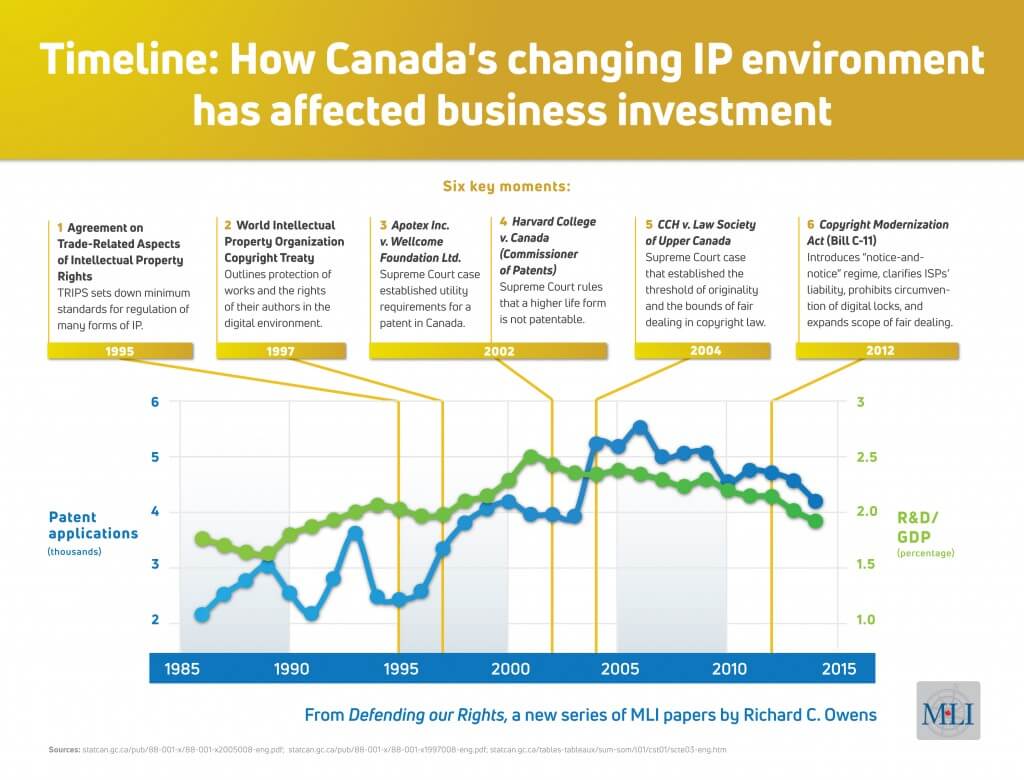Ottawa will need to take action on patents, copyright and anti-piracy measures to make Canada a world leader in intellectual property protection
OTTAWA, June 15, 2017 – Ottawa will need to adopt a bold strategy to fix a Canadian intellectual property regime that is rife with dysfunction, writes Richard Owens in a new paper for the Macdonald-Laurier Institute.
Patents, copyright and anti-piracy measures are some of the areas that will require the federal government’s attention as it follows through on its promise to craft a new intellectual property strategy for Canada.
“Over the last 30 years a great deal of shoring up and improving has been done, largely in response to treaty developments. This ought to continue,” writes Owens.
“But intellectual property rights (IPRs) are a living system and problems develop. And so this paper presents a review of IPR dysfunction in Canada, and suggests improvements worthy of a true intellectual property strategy”.
To read the full paper, titled “Eliminating dysfunction in Canada’s intellectual property regime”, click here.
This is the third in a series of MLI papers on strengthening Canada’s intellectual property regime.
In the first paper Owens and co-author Michael Robichaud documented the strong evidence that economic benefits and increased innovation are connected to stronger intellectual property protections. Even better, they don’t cost government anything.
In the second paper, the authors examined Canada’s history of IP law and participation in global agreements, and found that an economy like Canada’s is particularly well-suited to an environment of strong IP rights.
Owens offers the following recommendations in the series:
Patent subject matter: The exclusion of higher life forms from patentability sets Canada apart from every other OECD nation, which all allowed the patent on the famous “Harvard mouse.” Moreover, the Harvard College Supreme Court case could be a precedent to permit a lower court to disallow a patent on any novel subject matter it finds objectionable – new abortion medicines? – which is troublesome. Recommendation: As recommended in paper number 1, Canada should legislate patent protection for higher life forms.
Life sciences patents regime: We must recognize that Canada has significant R&D activity in life sciences and fix the unnecessary weaknesses in its IP regime for life sciences innovation. Recommendation: To that end Canada should:
- Adopt a term of patent restoration no less than the two-year minimum required by CETA and preferably, to be internationally competitive, five years.
- Address the judge-made utility requirements that are invalidating patents relating to clearly beneficial drugs and other life sciences inventions. If the Supreme Court does not reverse course with its upcoming decision on the AstraZeneca case, then a legislative fix is required.
- Promptly ensure an equal right of appeal for innovators of proceedings such as those currently brought under the Notice of Compliance regulations.
- Provide 10 years of data protection rather than the eight required by CETA.
Notice and notice: Whether or not a copyright pirate is also a soccer mom, as proponents like to suggest, is no more relevant to whether she should suffer the consequences of her actions than if she steals soccer equipment. Recommendation: Canada’s toothless “notice and notice” regime for dealing with infringers should be replaced by the stricter “notice and takedown” standard, with appropriate penalties too.
Fair dealing: “Fair dealing” has become as messy and ill-considered as notice and notice. This exception in the Copyright Act allows copying of a substantial portion of a work and even, in certain circumstances, all of it, without the author’s permission. The struggles of the educational publishing industry are illustrative of the negative effects. Recommendation: Reverse by legislation the excesses of the Supreme Court in expanding fair dealing in copyright.
User generated content: The “user generated content” provision of the Copyright Act essentially allows individuals to steal someone else’s work, mar it, and then distribute it through Youtube. While the section provides that this may be done only for non-commercial purposes, the way it is (very badly) worded makes it ineffective in preventing commercial use. Recommendation: This parochial deviation promoted by the “made-in-Canada” school of IP policy ought to be deleted from the Copyright Act.
Copyright term extension: As discussed in the first paper, there is no reason copyright should be singled out from other types of property for expiry. Recommendation: Canada should be bold and end copyright terms altogether, or failing that, adopt the widely-used term of 70 years plus the life of the author for all works.
IP in the courts: A number of the weaknesses in Canada’s IP regime, including the interpretation of fair dealing and the application of the promise doctrine, have been created by or exacerbated by the courts. IP is too important in the modern economy not to be well-served by the nation’s highest court. Recommendation: Ensure that solid intellectual property knowledge and skills are continuously represented on the SCC.
Additional recommendations: In addition to these recommendations above, the papers in this series have recommended supporting small and medium sized enterprises to attain patents; fully implementing recent trade agreements (TPP and CETA); and rejecting trade imbalances in IP-protected goods and services as the basis for IP policy.
“In all, this series makes 10 specific recommendations; each one intended to help position Canada as a leader in innovation, and together they could form the basis for an IP strategy that would serve Canada very well in the future”, writes Owens.
***
Richard Owens is a Munk Senior Fellow with the Macdonald-Laurier Institute and lawyer who has specialized in business and commercial law, regulation of financial institutions, intellectual property and technology.
The Macdonald-Laurier Institute is the only non-partisan, independent national public policy think tank in Ottawa focusing on the full range of issues that fall under the jurisdiction of the federal government.
For more information, please contact Mark Brownlee, communications manager, at 613-482-8327 x105 or email at mark.brownlee@macdonaldlaurier.ca.






